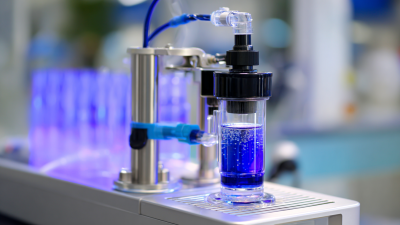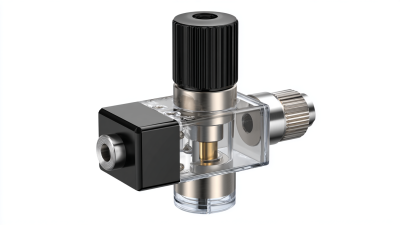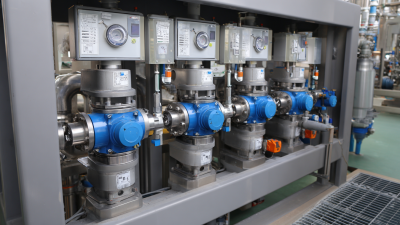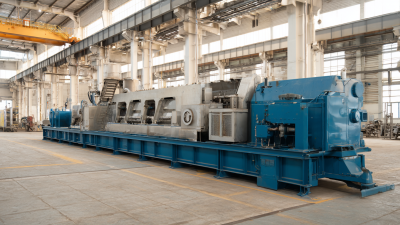In the rapidly evolving landscape of modern industrial applications, the role of the Micro Dosing Pump has emerged as a pivotal innovation, enhancing precision and efficiency across various sectors. Micro Dosing Pumps are specialized devices designed to dispense minute quantities of fluids with extraordinary accuracy, making them indispensable in industries such as pharmaceuticals, food and beverage, chemicals, and water treatment.

This ultimate guide delves into the innovative applications of Micro Dosing Pumps, exploring how they are revolutionizing processes by enabling better control over chemical compositions, reducing waste, and improving overall product quality. From automated production lines to advanced laboratory settings, the utilization of Micro Dosing Pumps is reshaping operational methodologies, and this guide aims to provide insights into their functionalities, benefits, and future potential in industrial environments.
Micro dosing pumps have emerged as a groundbreaking solution in industrial applications, offering several advantages over traditional pumping systems. One of the most notable benefits is their precision. Unlike conventional pumps, which may deliver a variable flow rate, micro dosing pumps are designed to dispense minute quantities of liquid with high accuracy. This precision is crucial in sectors such as pharmaceuticals and chemicals, where even the slightest deviation in dosage can lead to significant quality issues or safety hazards.
Another advantage of micro dosing pumps is their ability to handle a wide range of fluids, including viscous or corrosive substances. Traditional pumps may struggle with these materials, but micro dosing technology ensures consistent performance regardless of fluid characteristics. Additionally, the compact design of micro dosing pumps allows for easier integration into existing systems, enabling companies to enhance their production processes without major overhauls. Their low energy consumption compared to larger pumps also contributes to cost savings and increased sustainability in industrial environments.
Micro dosing pumps have emerged as a critical component in various key industries, playing a significant role in enhancing efficiency and precision in processes. The chemical manufacturing sector, for instance, increasingly employs micro dosing technology to maintain exact concentration levels of additives and reactants. According to a report by MarketsandMarkets, the global micro dosing pump market is projected to reach USD 2.3 billion by 2025, with a CAGR of 5.5%. This growth indicates a rapidly increasing adoption of these pumps for their unparalleled accuracy in fluid handling.
In the pharmaceutical industry, micro dosing pumps are utilized to dispense active pharmaceutical ingredients (APIs) with high precision, a practice crucial for both regulatory compliance and product quality. A data study by Grand View Research highlights that the demand for micro dosing systems in pharmaceuticals could grow by 7.6% annually, as manufacturers seek to optimize product yield while minimizing waste. Additionally, the food and beverage industry leverages these pumps for flavoring additives and preservatives, ensuring consistent taste profiles while adhering to safety standards. These applications underscore the versatility of micro dosing pumps across multiple sectors, driving innovation and operational efficiency.

The debate between micro dosing pumps and conventional dosing systems is becoming increasingly pivotal in modern industrial applications. Micro dosing pumps excel in precision, allowing for the accurate dispensing of small volumes of liquids, which is crucial in industries such as pharmaceuticals, food and beverage, and chemical processing. When we analyze the performance metrics of both systems, micro dosing pumps demonstrate superior control over flow rates and a significant reduction in waste. This precision not only enhances product quality but also contributes to operational efficiency and cost savings.
On the other hand, conventional systems, while often less expensive upfront, lack the fine-tuning capabilities that micro dosing pumps offer. They typically operate on a larger scale, which can result in over-dosing or under-dosing, impacting the final product's consistency. Additionally, maintenance and downtime tend to be higher with conventional systems due to their complexity and larger component requirements. Overall, the comparative analysis reveals that although micro dosing pumps may require a higher initial investment, their performance advantages often result in long-term savings and improved product quality, making them a compelling choice for industries seeking to innovate and enhance their processes.
| Metric | Micro Dosing Pumps | Conventional Systems |
|---|---|---|
| Flow Rate (L/hour) | 0.01 - 5.0 | 1.0 - 500 |
| Precision (%) | ± 1% | ± 5% |
| Power Consumption (W) | 5 - 50 | 50 - 500 |
| Size (cm) | 15 x 10 x 10 | 40 x 30 x 30 |
| Maintenance Frequency (months) | 12 | 6 |
| Cost ($) | 500 - 3000 | 2000 - 15000 |
The integration of micro dosing pumps into various industrial applications has been gaining traction, not just for their precision but also for the substantial cost benefits they offer in the long run. These advanced pumps allow for the accurate delivery of fluids in smaller quantities, which minimizes waste and optimizes resource use. Industries that rely on chemical dosing, pharmaceuticals, and food manufacturing can significantly reduce their material costs by using micro dosing technology instead of traditional methods. By maintaining strict control over the process, companies can avoid excess consumption of expensive ingredients and ensure product consistency.

Beyond material savings, micro dosing pumps contribute to lower operational costs by streamlining processes. Their automation capabilities reduce the need for manual intervention, thus decreasing labor costs and minimizing human error. Additionally, the precise dosing capability often leads to enhanced product quality, which can decrease returns or reworks, further promoting financial savings. With energy-efficient designs, these pumps also help in reducing energy consumption during production, amplifying the overall cost benefits. As industries continue to face economic pressures, the adoption of micro dosing pumps presents an attractive solution that not only addresses immediate operational costs but also supports sustainability goals.
Micro dosing pumps have revolutionized various industries by enabling precise fluid handling in processes where accuracy is paramount. In the pharmaceutical sector, for example, companies have successfully integrated micro dosing pumps to facilitate drug formulation and production. A notable case study involves a leading pharmaceutical manufacturer that increased the accuracy of active ingredient dosing in its injectables by 50%. This implementation not only improved product consistency but also reduced waste, ultimately enhancing overall productivity.
In the food and beverage industry, micro dosing pumps have been employed to deliver flavors and additives with incredible precision. A prominent beverage company implemented micro dosing technology to ensure consistent flavor profiles across its products. By utilizing these pumps, the company achieved a reduction in the variability of flavor concentration, leading to a more reliable consumer experience. This case exemplifies how micro dosing pumps can maintain quality control and streamline production processes, responding efficiently to market demands.






